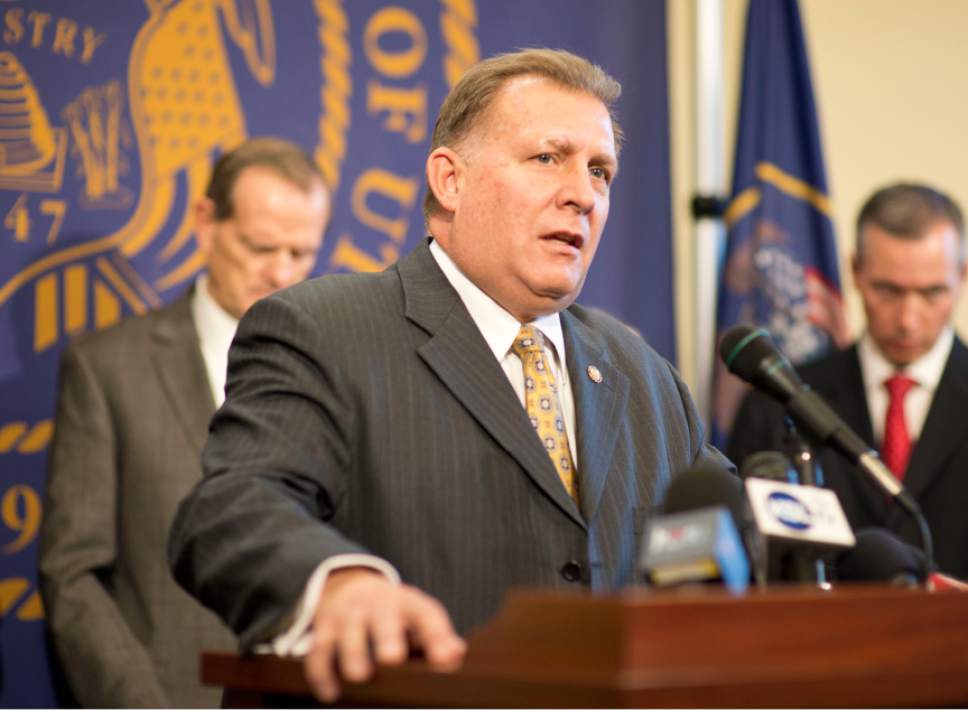This is an archived article that was published on sltrib.com in 2016, and information in the article may be outdated. It is provided only for personal research purposes and may not be reprinted.
How honest are Utahns? By law, they are supposed to pay sales tax on any online purchases they make by voluntarily adding it to their state income tax returns.
Last year, a few honest souls paid about $200,000 total in Utah. How much was owed?
"The estimates range from $80 million to $350 million," said Sen. Curt Bramble, R-Provo, adding that the lost revenue is a growing concern because online sales are increasing by double-digit percentages each year.
So Bramble, who is president of the National Conference of State Legislatures (NCSL), said Monday that states are about to launch a national drive to make companies collect tax on all Internet sales and remit it to the states.
As part of that, he expects the Utah Legislature to debate a bill that "will say if you are a business and selling in Utah, you've got to collect the tax." And for those who do not, "We're going to assess it against you because you failed to collect it."
Currently, merchants selling products online have to collect sales tax only if they have a physical location — such as a store or warehouse — within the state where the purchase is made.
Bramble told a conference of the Utah Taxpayers Association that he expects perhaps several bills to address the problem in various ways during the legislative session, which opens later this month.
But he expects at least one bill to closely mirror NCSL preferences designed to increase the likelihood that expected lawsuits over such legislation would lead the U.S. Supreme Court to overturn previous decisions that have limited online sales tax collection.
Still, Bramble said, the real intent is to urge Congress to act on a national solution. He said if numerous states start passing bills of their own — which may create many different rules around the country — it might just bring enough pressure to prod Congress to act.
"States believe that a federal solution is the best solution," Bramble said. One of those possible national solutions is a bill proposed by Rep. Jason Chaffetz, R-Utah, which says sales tax is owed where a product is delivered.
Bramble said that finding a solution to the Internet sales tax problem is a top priority both for the NCSL and the National Governors Association (of which Gov. Gary Herbert is president).
Bramble is quick to say that he does not see such action as a tax hike or as a potential windfall for the state.
"The money is already owed" by law, he notes, even if it is rarely paid. For example, if an income tax audit of someone's returns finds that someone did not pay all taxes owed and forces them to do so, "Is that a tax increase?" He said it is not.
To prevent a windfall of hundreds of millions of dollars a year, Bramble said Utah legislation would require lowering the state's sales tax rates to generate the same amount that was collected before all online sales were added. He said residents would pay overall the same collectively that they had paid previously.
But going forward, it would allow the state to capture taxes on those growing Internet sales and make it easier to budget.
Sen. Lyle Hillyard, R-Logan, co-chairman of the Executive Appropriations Committee, told the conference Monday that projections for sales taxes — which provide the bulk of the state's general fund — have been lower than expected this past year.
"One problem is Internet sales. People are buying things on the Internet and not paying sales tax," Hillyard said. "We figure $160 million to $190 million was lost last year."
Such losses, which are growing each year, make it more difficult to fund state services, Hillyard said.
Bramble said he expects opposition from companies that have large online sales. He noted that Utah does allow them to keep a portion of the sales tax they collect to cover their administrative costs.
That is $1.35 for every $100 in tax collected. "That's the highest in the nation," he said.





